In the world of power tools, Bosch is a well-known and trusted brand. Known for their high-quality products, Bosch has been a go-to choice for many professionals and DIY enthusiasts alike. One of the key components in Bosch’s power tools is its 18V battery.
However, as with any other battery, there may come a time when your Bosch 18V battery stops charging. This can be frustrating, especially when you have a project to complete. But fear not, in this document, we will discuss how you can troubleshoot and fix your Bosch 18V battery not charging issue.
What Is Bosch 18V Battery?

Reasons Why The Bosch 18V Battery Won’t Charge
Before we dive into the solutions to fix your Bosch 18V battery not charging, it’s essential to understand why this issue may occur in the first place. There can be several reasons for a dead or malfunctioning battery, including:
- Faulty Charger: A faulty charger is one of the most common culprits of a non-charging battery. Over time, the charger’s components may wear out or become damaged, resulting in a failed charging process.
- Expired Battery: Like any other battery, the Bosch 18V battery has a shelf life. Once it reaches its expiration date, it may not hold a charge or function correctly.
- Dirty Contacts: Dust and debris can accumulate on the battery contacts over time, hindering the charging process. If not cleaned regularly, this can result in a non-charging battery.
- Extreme Temperatures: Extreme temperatures, whether too hot or too cold, can affect the performance of your Bosch 18V battery. In extreme cases, it may even render the battery completely useless. [3]
Bosch 18V Battery Terminals
First Terminal – Positive (+)
The positive terminal is the larger of the two terminals and is marked with a plus sign. This terminal is where the battery’s power output flows from, powering your tools when connected. [3]
Second Terminal – Negative (-)
The negative terminal is smaller in size and marked with a minus sign. It acts as the return path for the current flow and helps complete the circuit. [3]
Three Hidden Terminals
In addition to the two main terminals, there are also three hidden terminals on the Bosch 18V battery. These terminals are responsible for transferring data between the battery and the power tool, such as battery level and temperature. [3]
Fifth Terminal – Thermistor
The fifth terminal, also known as the thermistor, is a safety feature that monitors the battery’s temperature. If it detects overheating, it will shut off the battery to prevent any damage. [3]
How To Charge A Bosch 18V Battery?
To charge your Bosch 18V battery, follow these simple steps:
- First, ensure that the charger is securely plugged into a working electrical outlet. This will provide a stable power source for the charging process.
- Carefully insert the battery into the charger, ensuring that the contacts on the battery align properly with the corresponding contacts on the charger. This alignment is crucial for an efficient and effective charging experience.
- Once the battery is properly inserted, the charging process will commence automatically. You can easily monitor the progress of the charging by observing the indicator lights on the charger. These lights will illuminate and show the gradual progress of the charging cycle, giving you a clear indication of when the battery will be fully charged.
- When the charging is complete, it is important to remove the battery from the charger. This will prevent overcharging and help prolong the overall lifespan of the battery. Additionally, make sure to disconnect the charger from the power source to ensure safety and conserve energy. [1]
By following these detailed steps, you can confidently charge your Bosch 18V battery and ensure its optimal performance for all your power tool needs.

Check The Charger With A Multimeter First
If your Bosch 18V battery is not charging, the first step you should take is to check the charger with a multimeter. Connect the multimeter to the charger and measure the voltage output. A proper functioning charger should have a voltage reading within the specified range for the battery.
If there is no output of power indicated by the multimeter, then it is likely that the charger is faulty and in need of replacement or repair. In such cases, it is recommended to contact the manufacturer or a certified service center for further assistance. Taking prompt action to address the charging issue will ensure that your Bosch 18V battery continues to provide reliable power for your tools and equipment. [1]
Clean Off The Terminals
As mentioned earlier, dirty contacts can prevent your Bosch 18V battery from charging correctly. Over time, dust and debris can accumulate on the terminals, hampering the efficient flow of power. To ensure optimal charging performance, it is recommended to regularly clean the battery terminals with a soft, dry cloth. By doing so, you can effectively remove any build-up and maintain proper contact, enabling efficient charging of your battery. Taking a few moments to clean the terminals will help prolong the lifespan of your battery and ensure reliable performance. [1]
Check That There Is Power To The Charger
Another common issue that can lead to a non-charging Bosch 18V battery is a lack of power supply to the charger. Before concluding that your battery is at fault, it is important to thoroughly check the power outlet and ensure that it is supplying electricity. Verify that the power cord is securely plugged in and that there are no loose connections. You can also try using the charger on a different outlet to eliminate the possibility of a faulty power source. Additionally, it may be helpful to test the charger with another compatible battery to determine if the issue lies with the battery or the charger itself. Taking these steps will help you troubleshoot and identify the root cause of the non-charging issue more effectively. [1]
Hold The Power Button
In certain situations, when encountering a charging problem with your Bosch 18V battery, a simple reset might prove to be the solution. If you find that the battery fails to register any charge even when properly connected to the charger, you can attempt to rectify the issue by holding down the power button for a few seconds. This action usually triggers a reset cycle, effectively addressing any minor technical glitches that could be the underlying cause of the charging problem. By following this step, you can potentially restore the battery’s functionality and ensure a seamless charging experience. [4]
Troubleshoot Your Cable, Charger, Outlet & Case
If you have tried all the above steps and are still unable to charge your Bosch 18V battery, then it may be necessary to troubleshoot further. You can begin by checking the charger cable for any damages or defects that could be hindering its performance. Next, inspect the charger itself for any visible signs of damage or wear. If both the cable and charger appear to be functioning correctly, you can move on to examining the electrical outlet. Ensure that there is no damage to the outlet and that it is providing a stable power supply. Lastly, check the battery case for any cracks or damage that could potentially affect its functionality. [4]

Troubleshoot Your Battery Charge
Troubleshoot Your Screen
Another potential cause for a Bosch 18V battery not charging could be an issue with the screen. The screen is responsible for displaying important information such as the charge level and time remaining until full charge. If the screen is not functioning correctly, it may prevent the battery from charging properly or provide inaccurate readings. In such cases, it is recommended to contact the manufacturer or a certified service center for assistance. They will be able to diagnose and address any technical issues with the screen, ensuring that your battery is charging accurately and efficiently. [4]
Consider Replacing The Battery
If all troubleshooting efforts fail, and your Bosch 18V battery is still not charging, it may be time to consider replacing the battery. Despite proper care and maintenance, batteries do have a limited lifespan and will eventually need to be replaced. When purchasing a new battery, make sure to select one that is compatible with your power tools and equipment. It is also essential to follow the manufacturer’s instructions for proper usage and charging to ensure optimal performance and prolong the lifespan of your new battery. Regularly checking and maintaining your new battery will help avoid any potential charging issues in the future, providing you with reliable power for all your projects. [2]
Advantages Of Bosch 18V Battery Technology
The Bosch 18V battery is a powerful and versatile tool that offers many benefits. It is designed to provide long-lasting power, making it ideal for both professional and DIY use. The advanced technology used in these batteries ensures fast charging times and consistent performance, allowing you to work efficiently without interruptions. Additionally, the compact size of the battery makes it lightweight and easy to handle, reducing fatigue and improving overall comfort during use. Furthermore, the battery is equipped with a battery management system that protects against overcharging and overheating, ensuring safe and reliable operation. With these features, the Bosch 18V battery provides an excellent power source for all your projects. [2]
Disadvantages Of Bosch 18V Battery Technology
While the Bosch 18V battery offers many advantages, there are also some potential disadvantages to consider. The battery may be more expensive compared to other brands or types of batteries, making it less accessible for those on a tight budget. Additionally, like all rechargeable batteries, the Bosch 18V battery will eventually lose its charge capacity over time and require replacement. However, with proper care and maintenance, including correctly storing the battery when not in use, you can prolong its lifespan and minimize the need for frequent replacements. [2]

Safety Precaution When Dealing With Batteries
When handling batteries, it is absolutely crucial to prioritize safety and take all necessary precautions to avoid potential hazards. To ensure the safe usage, storage, and disposal of batteries, it is highly recommended to carefully read and diligently follow the manufacturer’s instructions. By doing so, you can guarantee that you are using the batteries in the intended manner and minimize any risks associated with improper handling.
One important guideline to remember is to never mix old and new batteries. This is because the different levels of charge and chemical composition between old and new batteries can lead to unexpected malfunctions or accidents. It is also imperative to refrain from using damaged batteries, as they can pose serious risks and compromise both the performance and safety of the battery.
In terms of storage, it is advisable to keep batteries in a cool and dry place. Extreme temperatures and moisture can negatively impact the performance and lifespan of batteries, so it’s best to avoid exposing them to such conditions. Additionally, always ensure that you are using the correct charger for your battery and disconnect it promptly once the charging process is complete. This not only helps maintain the battery’s optimal performance but also minimizes any potential risks associated with prolonged charging.
By handling batteries with care and adhering to these safety practices, you can not only extend the lifespan and maximize the performance of your batteries but also safeguard yourself and others from any potential risks or accidents that may arise from improper battery handling. [2]

FAQ
Why won’t my Bosch battery charge?
There could be several reasons why your Bosch 18V battery is not charging. It could be due to a faulty charger, damaged cable, inadequate power supply, or a defective battery. Troubleshooting these components can help identify the issue and determine the appropriate solution.
How do you fix a lithium battery that wont charge?
First, check the battery for any visible damage or defects. Next, inspect the charger and electrical outlet for any issues. If everything appears to be in good condition, use a multimeter to check the charge level of the battery. If it is significantly lower than expected or shows no voltage at all, it may need to be replaced. It is also recommended to contact the manufacturer for further assistance.
Why is my Bosch battery charger flashing red?
A flashing red light on a Bosch battery charger usually indicates that the battery is too hot or too cold to charge. It could also mean that there is an issue with the charger itself. Allow the battery to cool down or warm up before attempting to charge it again, and if the issue persists, contact the manufacturer for further assistance.
Why is my battery blinking red and not charging?
A blinking red light on a battery usually indicates that it is not receiving enough power to charge. Make sure the charger is plugged in correctly and securely, and try using a different outlet. If the issue persists, there may be an issue with the battery or charger that requires further troubleshooting or replacement.
Does red blinking light mean charging?
A red blinking light on a charger or battery usually indicates that it is in the process of charging. However, if the light continues to blink for an extended period of time or appears irregular, it may indicate an issue with the charging process and should be addressed accordingly.
Why is my red battery symbol flashing?
A flashing red battery symbol usually indicates that the battery is low on charge or has an issue with charging. Try charging the battery and if the issue persists, there may be a problem with the battery or charger that requires further attention. Overall, it is essential to regularly check and maintain your Bosch 18V batteries to ensure optimal performance and longevity for all your power tool needs. With proper care and usage, these batteries can provide reliable power for years to come.
Why is my battery light flashing red?
A flashing red light on a battery usually indicates that it is low on charge or has an issue with charging. Try charging the battery and if the light continues to flash, there may be a problem with the battery or charger that requires further troubleshooting. Contacting the manufacturer for assistance is recommended in this situation.
Why is my battery tender blinking red?
A blinking red light on a battery tender usually indicates that the battery is not receiving enough power to charge or there may be an issue with the battery itself. Try using a different outlet or charger, and if the problem persists, contact the manufacturer for further assistance. Overall, it is crucial to regularly check and maintain your batteries to ensure safe and efficient operation.
Useful Video: Fixing a “Bad” Bosch Lithium Battery
Conclusion
In conclusion, the Bosch 18V battery offers many advantages for power tool users, including long-lasting power, portability, and safety features. However, it is essential to consider potential drawbacks and take necessary precautions when handling batteries to ensure optimal performance and safety. By following proper maintenance techniques and addressing any issues promptly, you can enjoy reliable power for all your projects with Bosch 18V batteries. So, whether you are a professional or DIY enthusiast, invest in quality Bosch 18V batteries for all your power tool needs. Remember to always prioritize safety and proper usage when dealing with any type of battery. Happy tooling!
References
- https://portablepowerguides.com/bosch-battery-charger-not-working/
- https://ru.ifixit.com/Wiki/Bosch_PS21_Troubleshooting
- https://www.fixya.com/support/t21991650-bosch_charger_not_charging
- https://www.festoolownersgroup.com/other-tools-accessories/bosch-liion-batteries-failing/



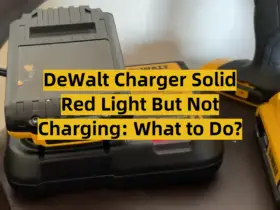







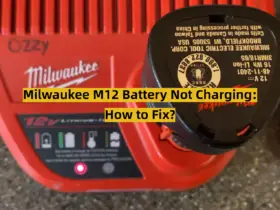
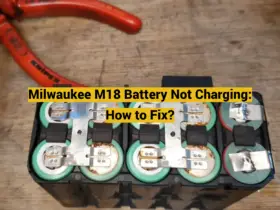
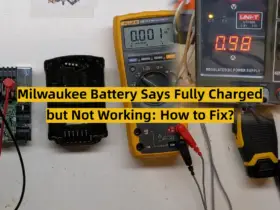
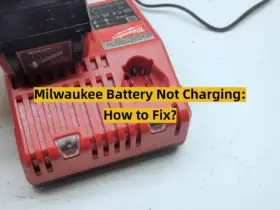
Leave a Reply